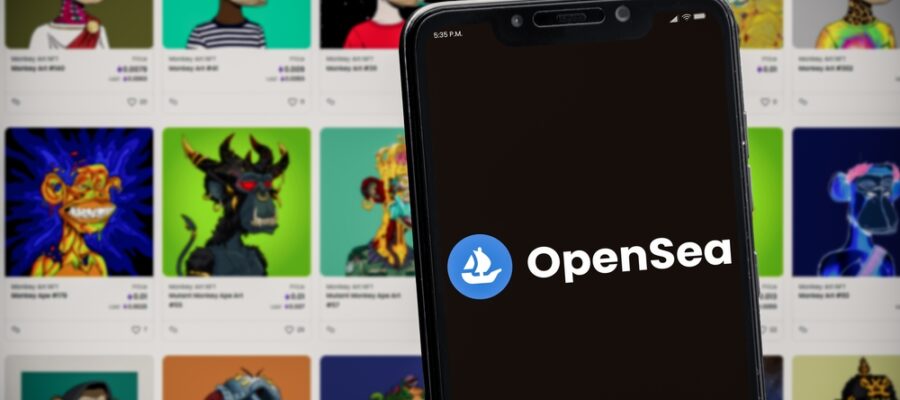The leading NFT Marketplace OpenSea chief confirms receiving a Wells Notice from the SEC alleging that NFTs are securities.
Global leading NFT marketplace OpenSea expects the US Securities and Exchange Commission (SEC) to level charges alleging NFTs are securities. In Wednesday’s update, openSea chief executive Devin Finzer expects a lawsuit following scrutiny from the regulator claiming non-fungible tokens (NFTs) are securities.
OpenSea co-founder Finzer disclosed in a Wednesday post on X that the SEC served a Wells Notice threatening regulatory action in the belief that NFTs listed on its platform constitute securities.
The CEO expressed shock that the SEC intends to enforce a sweeping move targeting artists and creators. Nonetheless, the OpenSea chief vowed the marketplace would vigorously defend against such a move.
The securities watchdog has, in recent years, issued numerous notices to various companies in the crypto space. Such announces the conclusion of investigations into the entity and confirms plans to initiate enforcement action.
SEC Wells Notice to OpenSea
The notice reportedly served to the OpenSea signals an escalation of the Gary Gensler-led Commission to scrutinize NFTs. The case is unique despite the agency’s success in convincing the courts that selling crypto tokens plausibly is a securities scheme.
The NFTs offered for sale on the OpenSea platform constitute a unique asset class. Such shares similarities with the arts and collectibles – a segment the SEC appears to refrain from regulating.
It is uncertain the NFT collections that the SEC will label as securities should it bring forward the lawsuit against OpenSea. Efforts to reach the regulator’s spokesperson for comment were dismissed, saying that no comet is possible on the existence and nonexistence of a potential investigation.
The OpenSea has yet to comment on the scope of the SEC’s Wells Notice. Nonetheless, the list is expansive since the marketplace has tens of thousands in collections of NFTs.
The collection is diverse, including on-chain artworks from independent artists, phygital, and digital collectibles. Also, the collection features flashy profile picture (PFP) items, including Bored Ape Yacht Club (BAYC) and CryptoPunks. The projects have, in years past, witnessed speculative interest and accumulated massive valuations.
OpenSea chief Devin Finzer pledged $5 million in legal fees for the NFT artists and developers who could soon receive the Wells Notices. Additionally, the executive urged creators to sustain their innovations.
Should the SEC sue OpenSea, it would portray the initial time the agency is pursuing an NFT project. The Stoner Cats’s team announced a $1M settlement with the SEC in September last year for the NFT-based cartoon series featuring actress Mila Kunis.
Unlike the Stoner Cats case, the potential of charging OpenSea would represent a broader assault on the capability of centralized marketplaces facilitating sales in transactions involving NFT artworks and collectibles.
The Stoner Cats case featured the claim by the agency that the platform promoted the capability to resell the NFTs as a concrete value-add. The agency cited such as evidence the digital tokens portrayed unregistered securities.
Proactive Lawsuit Against SEC
Fine artworks alongside the in-demand collectibles, including Andy Warhol paintings and rare Pokémon cards, have the universal function of storing value. Such could be invaluable investments besides the cultural value they possess. Consequently, the SEC will encounter challenges justifying how to regulate digital collectibles and art NFTs, not physical artworks and souvenirs.
University of Kentucky law professor Brian Frye likens the NFT market to the art market before the SEC creation. The SEC has yet to regulate the art market.
The NFTs and securities law scholars argue that if the SEC considers the art market as offering securities, it should state and attempt to regulate. If not, Frye suggests leaving OpenSea alone.
Frye teamed up with musician Jonathan Mann, who funded his work with NFTs in a proactive suit against the SEC. The suit attempts to compel the Commission to define NFT types constituting securities.
The pair feared that failure to initiate the proactive lawsuit would have the SEC classify NFTs, including pure artworks on-chain, as blanket-banned in the country. The SEC could accomplish that by citing little logic to underpin the move.
Frye considers the news emerging of SEC serving OpenSea with Wells Notice validates the fears. Such justifies the grounds for filing a proactive lawsuit against the agency.
Editorial credit: JOCA_PH / Shutterstock.com
All trademarks, logos, and images displayed on this site belong to their respective owners and have been utilized under the Fair Use Act. The materials on this site should not be interpreted as financial advice. When we incorporate content from other sites, we ensure each author receives proper attribution by providing a link to the original content. This site might maintain financial affiliations with a selection of the brands and firms mentioned herein. As a result, we may receive compensation if our readers opt to click on these links within our content and subsequently register for the products or services on offer. However, we neither represent nor endorse these services, brands, or companies. Therefore, any disputes that may arise with the mentioned brands or companies need to be directly addressed with the respective parties involved. We urge our readers to exercise their own judgement when clicking on links within our content and ultimately signing up for any products or services. The responsibility lies solely with them. Please read our full disclaimer and terms of use policy here.

